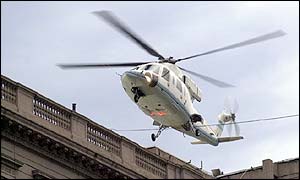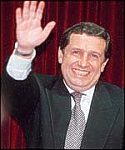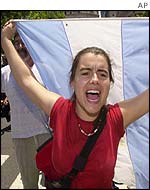Argentina names caretaker leader
Friday, 21 December, 2001, 16:33 GMT
http://news.bbc.co.uk/1/hi/world/americas/1723066.stm

President de la Rua left by helicopter after resigning
Argentina's Congress has accepted the resignation of President Fernando de la Rua, who was forced to step down amid the country's worsening economic crisis.
Lawmakers have scheduled another session on Saturday to decide who is to replace him.
In his last act as president, Mr de la Rua lifted the state of emergency he had imposed on Wednesday during street protests that left more than 20 people dead.
Ramon Puerta, the head of the Senate, will act as interim president for a maximum of 48 hours until Congress chooses a successor.
The BBC's Tom Gibb, who is in Buenos Aires, say Congress is likely to decide to call new elections, probably in 90 days' time.
- What caused the protests
- Savers only allowed to withdraw $250 a month
- Pensions to 1.4m retirees delayed
- Unemployment at 18%
- 2,000 people drop below poverty line each day
- Economy in recession for four years
With the country facing economic and political turmoil, correspondents say the next president's job could be a poisoned chalice.
Mr de la Rua made a surprise return to Government House in Buenos Aires on Friday morning, blaming the crisis on the opposition Peronists for refusing his offer to form a government of national unity.
His last act as president was to lift the state of emergency he had declared on Wednesday, in the midst of riots and impending economic chaos.
 Street battles
Street battles
Ramon Puerta is set to take over as interim president
On Thursday, Mr de la Rua left Government House by helicopter after a day spent watching battles outside between protesters and police.
It was the worst unrest since Argentina's return to democracy in 1983, with hundreds of thousands of people taking to the streets to protest at economic hardship.
At least 20 people were killed in the protests.
Mr de la Rua's departure drew cheers from protesters and some danced in the streets.
- If only the name of our president changes and not the course of our economy, then we will have lots more days like 20 December.
- Carlos Carpaneto, Argentina
Earlier, police tried to restrain the crowds by charging them on horseback and pummelling them with water cannon and volleys of tear gas - often firing directly at protesters.
More than 2,000 people were arrested nationwide.
In Buenos Aires, one woman's toe was cut off when stamped on by a police horse, others were carried kicking and shouting to police vans.
Rioters set fire to the finance ministry and two major banks.
In other large cities, looters ransacked homes and supermarkets.
Economic challenge
Public fury was sparked by government austerity measures aimed at reviving the economy, plagued by huge debts and unemployment at almost 20%.
CRISIS MOUNTS:
Wednesday
Widespread looting
President declares emergency powers
Cavallo resigns
Thursday
Protests spread to Cordoba, Mendoza and Rosario
Death toll rises to 20
President de la Rua resigns after failing to win opposition backing
Friday
Congress meets to decide way forward
All the members of Mr de la Rua's Cabinet have already handed in their resignations, although he only accepted that of the Economy Minister, Domingo Cavallo.
The BBC's Tom Gibb in Buenos Aires says urgent efforts are now under way to craft an alternative economic policy.
One idea is to end the system tying the Argentine peso to the US dollar. That would mean a devaluation and almost certainly a default on the country's $132bn debt.
Our correspondent says the big problem is that many ordinary Argentines have mortgages and other debts in dollars, as do businesses and farms.
The Peronists have not yet explained how they would fund the costly conversion of all of the debts into pesos.
Protests had been escalating since the government halted pension payments and froze bank accounts in an attempt to deal with the massive debts.
 Protesters have seen their living standards deteriorate sharply
Protesters have seen their living standards deteriorate sharply
The credit ratings agency Standard & Poor's has warned that Argentina could default on its sovereign debt as early as next month.
A default would in effect cut off any lifeline from the International Monetary Fund and send Argentina spiralling even deeper into economic crisis.
Similar unrest marked the last financial crisis in Argentina in 1989, forcing the then president, Raul Alfonsin, to leave office early.
Argentina has been in a recession for almost four years.
Earlier this month, the IMF refused Argentina a further $1.3bn in standby loans, unless it balanced its budget for the year 2002.
Mr Cavallo had put forward budget proposals slashing government spending by 20% - but only by cutting public sector wages and reducing pension provisions.